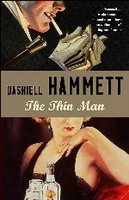It's hard-boiled, but it ain't no egg, dollface.
 I used the term “hard-boiled” in a previous post to describe The Grapes of Wrath as tough and unflinching, but I recently learned it's not just a cool adjective, it’s also a fictional genre, pioneered by Dashiell Hammett and improved upon, some say, by Raymond Chandler. According to wikipedia (god love ‘em), “hardboiled fiction is most commonly associated with detective short stories and novels. It is distinguished by an unsentimental portrayal of crime, violence and sex.”
I used the term “hard-boiled” in a previous post to describe The Grapes of Wrath as tough and unflinching, but I recently learned it's not just a cool adjective, it’s also a fictional genre, pioneered by Dashiell Hammett and improved upon, some say, by Raymond Chandler. According to wikipedia (god love ‘em), “hardboiled fiction is most commonly associated with detective short stories and novels. It is distinguished by an unsentimental portrayal of crime, violence and sex.”Nick actually introduced me to this genre—he requested The Thin Man as a book to read together, but we gave up after a couple chapters. Too much dialog and short, choppy sentences make it not “flow” well for reading-aloud purposes. But it was fun to read to myself.
The book is about Nick and Nora Charles, a hard-drinking, high-living married couple who banter wittily over martinis as they solve homicides (seemingly for the fun of it, as they are independently wealthy). A girl has been murdered, and her employer, Clyde Wynant, the titular thin man and nutty inventor, is missing in action. The other key suspects, Wynant’s ex-wife and seriously-dysfunctional children, are at the center of a web of clues and diversions which finally unravels in a nice-and-tidy-yet-surprising wrap-up.
You know those old black and white movies where a detective narrates in first person using words like “dollface” and names like “Studsy”? That’s Dashiell Hammett. Seriously, this is how the book starts out: "I was leaning against the bar in a speakeasy on Fifty-second Street..." The style is lean and spare, the plot is satisfyingly complex and the characters are fascinating—Nick and Nora are glamorous and cynical, the Wynant clan is screwed-up-bigtime and definitely not to be trusted, the police detective is a two-fisted, hard-talking tough guy, and Wynant’s lawyer is a little too slick. It’s all good stuff, though it can sound cliché if you forget the fact that it was 1933 and Hammett was inventing a genre. Raymond Chandler is quoted on the cover: “Hammett…wrote scenes that seemed never to have been written before.” I could totally see that. Here's a sample:
An immensely fat blonde man—so blond he was nearly albino—who had been
sitting at Miriam's table came over and said to me in a thin, tremulous,
effeminate voice: "So you're the party who put it to little Art Nunhei—"Morelli hit the fat man in his fat belly, as hard as he could without getting
up. Studsy, suddenly on his feet, leaned over Morelli and smashed a
big fist into the fat man's face. I noticed, foolishly, that he still led with
his right. Hunchbacked Pete came up behind the fat man and banged an empty
tray down with full force on the fat man's head. The fat man fell back,
upsetting three people and a table. Both bartenders were with us by then. One of
them hit the fat man with a blackjack as he tried to get up, knocking him
forward on his hands and knees, the other put a hand down inside the fat man's
collar in back, twisting the collar to choke him. With Morelli's help they got
the fat man to his feet and hustled him out.Pete looked after them and sucked a tooth. "That god-damned Sparrow," he
explained to me, "you can't take no chances on him when he's drinking."Studsy was at the next table, the one that had been upset, helping people
pick up themselves and their possessions. "That's bad," he was saying, "bad for
business, but where you going to draw the line? I ain't running a dive, but I
ain't trying to run a young ladies' seminary neither."Dorothy was pale, frightened; Nora wide-eyed and amazed. "It's a madhouse,"
she said. "What'd they do that for?""You know as much about it as I do," I told her.
See what I mean? No one (that I know of) wrote like that before Dashiell Hammett came along. Anyway, some final notes:
- Among the enduring characters Hammett created is Sam Spade in The Maltese Falcon.
- In 1934 The Thin Man was made into a movie which developed into a popular series.
- If you ever get a crossword clue about Nick and Nora Charles’ dog (I've seen it more than once in the NYT), the name is Asta.



2 Comments:
Perfect title for your blog, Lis! Fascinating to learn about a whole genre I didn't know existed--I mean I've seen some movies, but didn't know it was a real literary genre, or that it was invented by someone. Cool.
I wish I could take credit for the title, but I heard it on Turner Classic Movies channel--they were advertising a film noir marathon. :-)
Post a Comment
<< Home